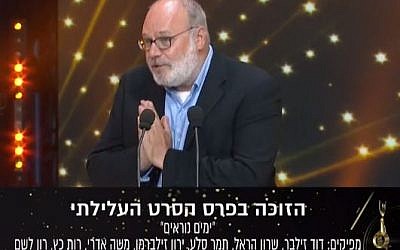‘Incitement’ wins best picture at Ophir Awards; Miri Regev rips movie for implying PM Netanyahu had role in stirring up hatred in days leading up to 1994 assassination

“Incitement,” a film about about the assassination of prime minister Yitzhak Rabin viewed through the eyes of the killer won the Best Picture award at the 2019 Ophir Awards on Sunday night, but drew immediate criticism from Israel’s populist culture minister who said it libeled Prime Minister Benjamin Netanyahu.
The Best Picture winner at the Ophir Awards, the country’s most prestigious cinema awards ceremony, is traditionally sent on to compete as Israel’s entry for Best Foreign Picture at the Oscars.

Despite being well reviewed, Culture Minister Miri Regev renewed her long-running feud with Israel’s Academy of Film and Television and slammed the choice of “Incitement,” saying there was “no place” in Israel for such a film and charged that it maligned Netanyahu who has been accused of incitement that led to the the November 4, 1995 murder.
“Yigal Amir is a murderer who shot a bullet into the heart of the nation and did the worst thing possible, kill a prime minister in a democracy,” said Regev. “There is no place for a film that tries to understand him or his motivations, or to hint, or accuse others of being behind his heinous act.”
Regev in particular took umbrage with the way that Netanyahu was portrayed.
“The creators did not miss an opportunity to assign Prime Minister Benjamin Netanyahu a part in the incitement campaign,” she said, calling such a portrayal “a distortion and an attempt to mislead the public, which was completely detached from reality.”
Netanyahu has repeatedly been accused of whipping up hatred in the run-up to the killing. Rabin was murdered by Amir, an extremist, ultra-nationalist Jew, who was opposed to the Oslo Accords and the handing over of control of parts of the West Bank to the Palestinians as a part of the landmark peace agreement.
In the weeks before the assassination, Netanyahu, then head of the opposition, and other senior Likud members attended a right-wing political rally in Jerusalem where protesters branded Rabin a “traitor,” “murderer” and “Nazi” for signing a peace agreement with the Palestinians earlier that year.
Netanyahu has regularly rebuffed the allegations that he ignored inflammatory rhetoric that incited to Rabin’s murder and characterized the accusations as a form of “political assassination.”
Regev then conceded that she had not actually watched the film and accused the Ophir Awards of “again legitimizing groups that seek to widen the chasms in Israeli society.”
Regev has a long and bitter history with the awards ceremony.

She walked out of the 2016 awards in protest of the recitation of a poem by Palestinian poet Mahmoud Darwish and was not invited back the following year.
That didn’t stop her from lambasting the 2017 winner “Foxtrot” for what she called an unfair and “twisted” portrayal of Israel Defense Force soldiers. She said she didn’t watch that one either.
Regev also noted that “Incitement” did not receive any funding from the state.
“Incitement,” directed by Yaron Zilberman also took home the award for casting. It had been nominated for 10 awards.
Accepting his award, Zilberman also appeared to take a dig at Netanyahu, who is battling for his political future after last week’s inconclusive elections.
Paying homage to Rabin, who he called “a giant of a man murdered in the struggle for peace,” he expressed his hopes that following the elections we were at the beginning of “a new era where leaders will, instead of inciting and dividing, unite us and make us love each other.”

The film stars Yehuda Nahari as Amir and follows him for the roughly two years that led up to the murder a peace rally in Tel Aviv.
Nahari said he was so traumatized by delving into the mind of the killer he had to seek therapy.
Amir, now 49, is serving a life sentence for the assassination of Rabin. He remains in solitary confinement.
Last month, he launched a brief hunger strike, protesting the confiscation of his telephone for two months after he used it for political purposes in violation of prison rules.
The film, which was released in Israel last Thursday, was well received internationally.
Variety, which reviewed it at the Toronto Film Festival earlier this month called it a a “provocative drama” and “a compelling watch.” The Hollywood Reporter said it “provokes and disturbs.”
As reported by The Times of Israel
